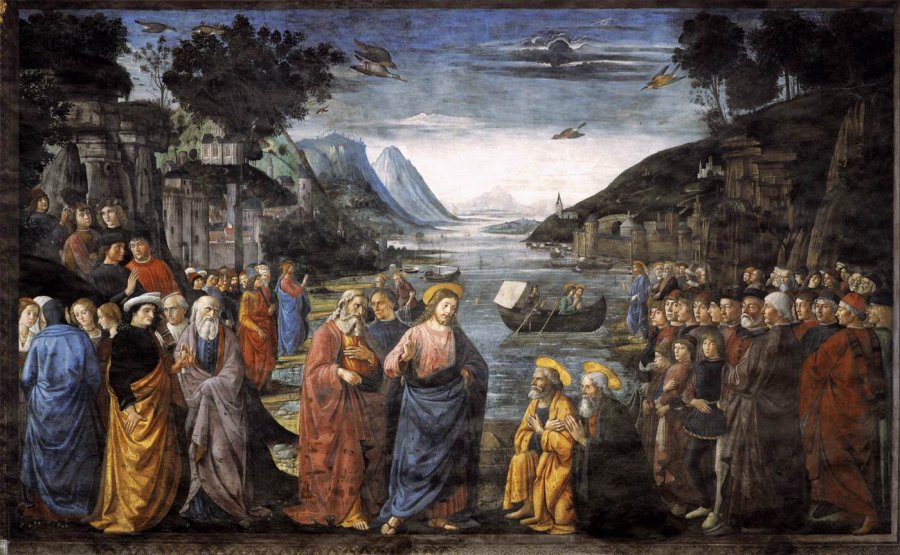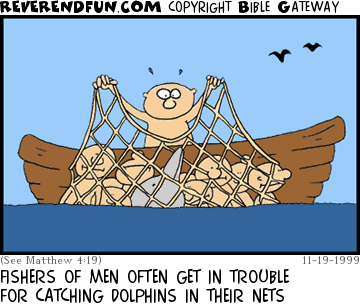Worship Helps for Epiphany 3
The Calling of Peter and
Andrew
Domenico Ghirlandaio
Worship Theme: Jesus shows
his glory in the kind of people that he calls to serve him and in using the
gospel to make them willing to follow him. This Sunday it is the epistle lesson
that gives unity to the readings, since all of the other readings deal with
specific calls to a full time following that leaves behind secular vocations.
Jesus still calls such to the holy ministry. To all however comes the call to
follow him with a willingness to abandon everything should faithfulness require
it; the calls in these readings bid us have a mindset that has forsaken
everything, even when we are not required to do it.
Epiphany
is a time for Christ’s light and revelation. The readings and hymnody of the
season follow a trajectory of glimpsing God’s will in Jesus Christ a little more
every week. This week reveals the amazing power of the Word of God. When God’s
Word is proclaimed, it changes lives. It does not return to God empty. God’s
Word overturns hearts and causes people to repent, to turn around, to leave
behind the ways of sin, death, and Satan, to follow Jesus.
Old Testament: 1 Kings 19:19-21
19So Elijah went from there and found
Elisha son of Shaphat. Elisha was doing the plowing with twelve teams of oxen
in front of him, and he himself was driving the twelfth team. Elijah crossed
over to him and threw his cloak over him. 20Then Elisha left the
oxen and ran after Elijah. He said, “Let me kiss my father and my mother
good-bye! Then I will follow you.”
Then Elijah said, “Go back! For what have
I done to you?”
21So Elisha turned back from
following him. Then he took the team of oxen and slaughtered them. Using the
equipment from the oxen as fuel, he cooked the meat and gave it to the people,
and they ate. Then he got up, followed Elijah, and served him.
1. What did Elijah placing
his cloak on Elisha signify?
2. Why did Elisha slaughter
his oxen and burn his plow?
Epistle: Acts 13:1–5
Now in the church at Antioch there were
some prophets and teachers: Barnabas; Simeon, who was called Niger; Lucius of
Cyrene; Manaen, who had been brought up with Herod the tetrarch; and Saul. 2While
they were worshipping the Lord and fasting, the Holy Spirit said, “Set apart
for me Barnabas and Saul for the work to which I have called them.” 3Then,
after they had fasted and prayed and laid their hands on them, they sent them
off.
4So they were sent out by the Holy Spirit and went down
to Seleucia. From there they sailed to Cyprus. 5When they arrived at
Salamis, they proclaimed the word of God in the Jewish synagogues. They also
had John as their assistant.
3. It is interesting that Manaen
(who had been brought up with Herod the tetrarch) is mentioned. This was the
Herod who had beheaded John the Baptist and put the robe on Jesus immediately before
the crucifixion. The Lord had brought to faith his foster brother! It is also
interesting that Mark is mentioned. Who was this John who “was with them?”
4. The gathering of
believers at Antioch was well served by a diverse group of five spiritual leaders.
What new plan did the Holy Spirit have for this congregation?
Gospel: Mark 1:14-20
14After John was put in prison, Jesus
went to Galilee, preaching the gospel of the kingdom of God. 15“The
time is fulfilled,” he said. “The kingdom of God has come near! Repent, and
believe in the gospel.”
16As Jesus was going along the Sea of
Galilee, he saw Simon and his brother Andrew casting a net into the sea, since
they were fishermen. 17Jesus said to them, “Come, follow me, and I
will make you fishers of men.” 18Immediately they left their nets
and followed him. 19Going on a little farther, he saw James the son
of Zebedee and his brother John. They were in a boat mending the nets. 20Immediately
Jesus called them. They left their father Zebedee in the boat with the hired
servants and followed him.
5. What does it mean that “the kingdom of God is near”?
6. Compare the message of
Jesus with that of John the Baptist. Describe their similarities. Can you find
any dissimilarities in their messages? What does this tell you about the
preaching of both Jesus and John?
7. What would Jesus do with
the disciples over the next three years? (v 17)
Answers:
1. This was no ordinary
cloak. This was the prophet’s cloak. The same cloak Elijah later threw down
from the fiery chariot and Elisha then used to part the waters of the Jordan
River. Placing the cloak upon Elisha passed on the prophetic office from one to
another, much the same way pastors lay hands upon the head of a new teacher or
pastor.
2. It appears that Elisha
was from a wealthy family because he was plowing with twelve teams of oxen. The
oxen and plow were no longer needed by Elisha, so they were killed and burned.
This was a farewell feast and then he was off to vicar for Elijah. He was
saying goodbye to his family and father’s farm, his work and inheritance. He
was giving up everything and unconditionally accepting his calling. He was devoting
himself entirely to his calling as a prophet.
3. This was John Mark who
was the cousin of Barnabas. He accompanied Paul and Barnabas on their first
overseas mission. He would later write the Gospel of Mark.
4. The Holy Spirit took two
of their five leaders and sent them overseas to do mission work.
5. Jesus came to establish
God’s kingdom of love, grace, and power for all. We become part of that kingdom
through repentance and faith. The word “near” can be better translated as “at
hand,” giving the word the sense of immanence implied in John’s and Jesus’
message.
6. The messages of both
Jesus and John are the same: prepare the way for the coming of the Lord by
means of repentance and Baptism for the remission of sins, because the kingdom
of God is near. There are no essential differences in their proclamations,
since they are both sent by God the Father. We need to reject the notion that
John was a preacher of the law and that Jesus was a preacher of the gospel.
Both of them preached the full message of law and gospel.
7. Jesus called these men
to follow him. In these words we have the definition of discipleship. Simon,
Andrew, James, and John were called to follow Jesus as pupils to learn how to
proclaim the good news of Jesus. Jesus would make them fishers of men. They
would learn from him how God intended to establish and extend his kingdom and
the role they would play.
Putting your faith into action
Ever since Christ came into
the world, things have been different. The kingdom of God is near. We must
respond to it. We can’t just shrug it off or push it to a later date on our “to
do” list. It demands our immediate attention. It’s a matter of life and death,
a matter of eternity. How do we enter the kingdom of God? Repent, Jesus said.
Through repentance and faith the kingdom of God is ours. Now, what do we do
with it? We cast it out into the world, like fishermen cast out a net. We
become fishers of men. Some will listen to Jesus’ call and do that in full-time
ministry. But the kingdom of God is not just theirs to share. It is still ours
by faith. All of us need to cast out the net into the world. Supporting the
mission and ministry of WELS is one way we participate in spreading the kingdom
of God and fishing for men.
The adversaries say that
satisfactions benefit by the outward work in such a way that, even though they
are done in mortal sin, they still deliver from the punishments. When the passage of Paul is cited against us,
“But if we judged ourselves truly, we would not be judged [by the Lord]” (1
Corinthians 11:31), “to judge” should be understood to include all of
repentance and required fruit, not works that are not required. Our adversaries pay the penalty for hating
grammar. They understand “to judge” to
equal making a pilgrimage dressed in armor, or similar works. “To judge” means all of repentance; it means
to condemn sins. This condemnation truly
happens in contrition and the change of life.
Isaiah 1:16–19 teaches, “Cease to do evil, learn to do good.… Though
your sins are like scarlet, they shall be as white as snow.… If you are willing
and obedient, you shall eat the good of the land.” Neither should a most important meaning be
transferred from all of repentance, and from works required or commanded by
God, to the works of human traditions.
Common evils are reduced by our repentance and by the true fruit of
repentance, by good works completed from faith.
Here belongs the example of the Ninevites (Jonah 3:10), who by their
repentance (all of repentance) were reconciled to God and received the favor
that their city was not destroyed. – Apology of the Augsburg Confession,
Article XIIIB, Confession and Satisfaction (paragraphs 65-69)
O God from God, O Light from Light,
O Prince of Peace and King of kings,
To you in heaven's glory bright
The song of praise forever rings.
To him who sits upon the throne,
The Lamb once slain but raised again,
Be all the glory he has won,
All thanks and praise! Amen, Amen.
Deep in the prophets' sacred page,
Grand in the poets' winged word,
Slowly, in type, from age to age
The nations saw their coming Lord;
Till through the deep Judean night
Rang out the song, "Good will to men!"
Sung by heav'n's hosts in splendor bright,
Re-echoed now, "Good will!" Amen.
That life of truth, those deeds of love,
That death of pain mid hate and scorn --
These all are past, and now above
He reigns, our King once crowned with thorn.
Lift up your heads, O mighty gates!
So sang the angel hosts again.
Lift up your heads -- your King awaits.
We lift them up, Amen, Amen.
Sing to the Lord a mighty song;
Sing to his name, his glories tell!
Sing, heav'nly hosts, your praise prolong,
And all on earth, your anthem swell!
Worthy the Lamb for sinners slain!
Forever let the song ascend!
Worthy the Lamb enthroned to reign,
Glory and pow'r! Amen, Amen.



Comments
Post a Comment